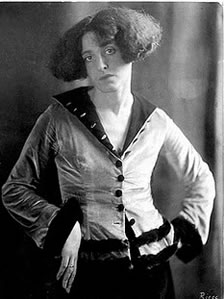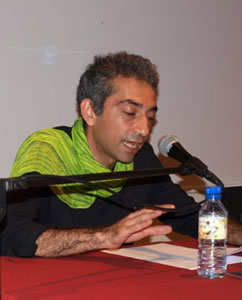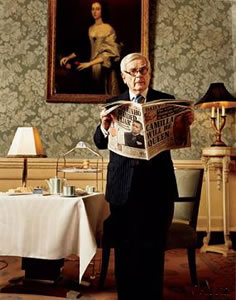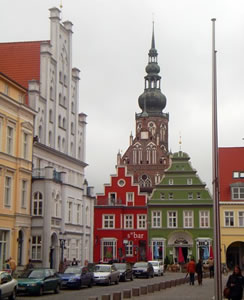De Duitse schrijver, dichter en literatuurwetenschapper Harald Hartung werd geboren op 29 oktober 1932 in Heme. Zie ook mijn blog van 29 oktober 2006 en ook mijn blog van 29 oktober 2008 en ook mijn blog van 29 oktober 2009.
Vor dem Frost
Du räumst die Blumenkästen
vom Balkon und trägst
den Oleander ins Treppenhaus
die Nächte werden kalt sagst du
Wärme geht von dir aus
An die Wand gemalt
Der an die Wand gemalte
Teufel fiel aus dem Rahmen
und griff zum Fleischerhaken
Unter die Tische gerutscht
beschlossen wir
vegetarisch zu leben
Im Garten
geschah das Unerhörte:
die Rosen trieben Menschenohren.
Auf den Tod von Inger Christensen
Diese ältere Dame
aaaaabebrillt wie eine Provinzlehrerin:
Aus ihren Gläsern blickte
aaaaaetwas jenseits von Kälte und Feuer
Einmal nach einigen Drinks
aaaaasteckte sie die Zigarette verkehrt
in den Mund und lachte noch
aaaaaJeder schloß seine Augen wenn sie las
diese dänische Musik!
aaaaaSommervögel sah man die gaukelten
über einem heißen Tal
aaaaaSommervögel oder Totenvögel
Ihr Alphabet ging bis n
aaaaaDann würden die Worte weiterwuchern
als Zellen oder Zeilen
aaaaains Weiß das die ewige Fülle ist

Harald Hartung (Herne, 29 oktober 1932)
De Zwitserse dichter, schrijver en filmmaker Matthias Zschokke werd geboren op 29 oktober 1954 in Bern. Zie ook mijn blog van 29 oktober 2008 en ook mijn blog van 29 oktober 2009.
Uit: Am Meer
„Gestern noch saß er auf der Hotelterrasse, schaute der Sonne zu, wie sie im Meer versank, versuchte, etwas dabei zu empfinden, Poetisches, Melodiöses, doch er sah nur die Kugel wegtauchen und war gleichmütig; dann stand er auf, und sie gingen zusammen essen, einen gegrillten Fisch mit Knoblauch und Bratkartoffeln, Salat, dazu tranken sie Wein; dann verließen sie das Restaurant, er schaute in den schwarzen Himmel, sah zwei, drei Sternschnuppen fallen, dachte daran, daß er sich bei der nächsten etwas wünschen sollte, überlegte, was er sich denn wünschen könnte, betrachtete das Gefunkel, sah keine weitere Sternschnuppe fallen; sie schlenderten am Ufer entlang zurück, legten sich ins Bett, hörten dem Meer zu und freuten sich aufs Einschlafen. Am folgenden Morgen war er kalt. So schnell geht das.
Sie war immer ruhig, wenn er draußen auf der Terrasse saß und der Sonne zuschaute oder den Sternen. Er guckte übelgelaunt und langweilte sich; zu Himmelskörpern fiel ihm nichts ein. Eigentlich saß er nur da, weil er nichts anderes mit sich anzufangen wußte. Er wartete auf sie, auf ihre Vorschläge. Und wenn es ihm zu lange dauerte, wurde er plötzlich wütend, sprang auf und rief hinein, er warte nicht mehr länger, er wisse, wie eine Sonne untergehe, er kenne das Meer, sie solle endlich voranmachen. Er trat ungeduldig an die Brüstung, ging auf und ab, drängelte, und sie mußte sich schnell anziehen und mit ihm das Zimmer verlassen. Doch schon im Treppenhaus verlangsamte er seine Schritte und wußte nicht weiter. Dann schaute er sie mißmutig an und erwartete, daß sie die Richtung vorgebe; kaum waren sie draußen ein paar Meter weiter gegangen, verlangte er, daß sie ihm erzählte, was sie tagsüber gedacht hatte. Ihre Sätze kommentierte er kaum. Er ging bloß neben ihr her und starrte mürrisch übers Meer. Und wenn sich im Gebüsch etwas regte, blieb er stehen, beugte sich vor, hielt den Atem an und versuchte herauszufinden, was da raschelte. Egal, ob sie gerade mitten in einem Satz steckte, er hörte ihr nicht weiter zu, um – wie nicht anders zu erwarten – jeweils eine Eidechse zu entdecken oder einen kleinen, grauen Vogel, irgendein alltägliches Tier halt, das an Straßenrändern, unter Sträuchern seine Zeit verbringt.
Jetzt sitzt er nicht mehr draußen auf der Terrasse, um der Sonne zuzuschauen, wie sie im Meer versinkt; und sie weiß nicht mehr, was die Terrasse soll, was die Sonne soll, das Meer – das kommt ihr alles leer vor, ohne Sinn, denn es muß doch von einem gesehen werden, wenn es etwas sein will.“

Matthias Zschokke (Bern, 29 oktober 1954)
De Duits – Franse schrijfster Claire Goll werd geboren op 29 oktober 1890 in Nürnberg. Zie ook mijn blog van 29 oktober 2006 en ook mijn blog van 29 oktober 2007 en ook mijn blog van 29 oktober 2008 en ook mijn blog van 29 oktober 2009.
Nie wieder
Das hab ich nie mehr gewollt
um das Telefon streichen am Fenster stehn
keinen Schritt aus dem Haus gehn Gespenster sehn
Das hab ich nie mehr gewollt
Das hab ich nie mehr gewollt
Briefe die triefen schreiben zerreißen
mich linksseitig quälen bis zu den Nägeln
Das hab ich nie gewollt
Das hab ich nie gewollt
Soll dich der Teufel holen.
Herbringen. Schnell.
Mehr hab ich das nie gewollt.
Entsündigung
Unter einem zärtlichen Mimosenbaum
Voll gelber Lächeln
Lieg ich –
Ohne die schamlosen Kleider
Ohne Stöckelschuhe, ohne Schmuck
Und Hut und Handschuh,
Den ganzen Kram der Stadt,
Die arme Verkleidung.
Nackt und fühlend an der riesigen Erde,
Die ich schüchtern in kleine Arme presse,
Und über mir der große Wind,
Der Weltreisende…
O sich in Blumen wiederzufinden,
O nur noch Erde zu sein!
Als ich noch eitel durch die Stadtstraßen ging,
Als ich noch wichtig am Postschalter stand
Oder beim Friseur die Haare kräuselte
– Während Mimosen von mir träumten –
Als ich mir noch die Nägel manikürte
Und nur daran dachte, zu gefallen, …
Als ich ganz mittellos an Seele war,
Hörte ich aus den Körben der Händler
Mimosen wild hinausschrein –
Dem Nichts, dem Kehricht, dem Tod entgegen –
Da floh ich ihren blonden Wäldern zu.
Sept Souhaits
Que ne suis-je le bandeau autour de ton front
Si proche de tes pensées!
Que ne suis-je le grain de maïs
Qu’écrasent tes dents de chat sauvage!
Que ne suis-je à ton cou la turquoise,
Chaude de la tempête de ton sang!
Que ne suis-je la laine multicolore
Du métier à tisser, qui glisse entre tes doigts!
Que ne suis-je la tunique de velours
Sur le flux et le reflux de ton coeur!
Que ne suis-je le sable dans tes mocassins
Qui ose caresser tes orteils!
Que ne suis-je ton rêve nocturne
Lorsque dans les bras noirs du sommeil, tu gémis!

Claire Goll (29 oktober 1890 – 30 mei 1977)
De Iraanse dichter en vertaler Mohsen Emadi werd geboren op 29 oktober 1976 in Teheran. Zie ook mijn blog van 29 oktober 2008 en ook mijn blog van 29 oktober 2009.
From The mute despair
1
I write of your eyes
the words melt into water
I drink the text
poisoned, I wander the alleyways
strange passers-by become poisoned
and beautiful
your beauty
embraces a deranged child
and walk her in the streets
I paint you with that child in your arms
on the coffin of words.
you walk
the distance between your barefeet and the earth
catches fire.
from my mother-tongue
I spread out a carpet under your feet
to dance on.
watching you
I scatter a poem of ashes
in my voice.
The Portrait of a Cat in the Evening
We were throwing our despair out of the rooms
and shouting: Be gone!
If a door stayed half-open carelessly
she would creep in to watch us with her only seeing eye
the wound of her blind eye
might have opened up to devour us
we would shut the doors and our despair, at last
would go out to play with the children.
One night
we came back to our rooms
locked up all the doors.
We had seen the children and her
who was running
running towards us in flames.
In the morning, on all fours
we were walking in the alleyways
the passers-by fleeing
people slamming the doors shut
and we
saying entreatingly: Mew, Mew! Mew, Mew!

Mohsen Emadi (Teheran, 29 oktober 1976)
De Poolse dichter, schrijver en essayist Zbigniew Herbert werd geboren op 29 oktober 1924 in Lemberg. Zie ook mijn blog van 29 oktober 2008 en ook mijn blog van 29 oktober 2009.
A ballad that we do not perish
Those who sailed at dawn
but will never return
left their trace on a wave–
a shell fell to the bottom of the sea
beautiful as lips turned to stone
those who walked on a sandy road
but could not reach the shuttered windows
though they already saw the roofs–
they have found shelter in a bell of air
but those who leave behind only
a room grown cold a few books
an empty inkwell white paper–
in truth they have not completely died
their whisper travels through thickets of wallpaper
their level head still lives in the ceiling
their paradise was made of air
of water lime and earth an angel of wind
will pulverize the body in its hand
they will be
carried over the meadows of this world.
Report From Paradise
In paradise the work week is fixed at thirty hours
salaries are higher prices steadily go down
manual labour is not tiring (because of reduced gravity)
chopping wood is no harder than typing
the social system is stable and the rulers are wise
really in paradise one is better off than in whatever country
At first it was to have been different
luminous circles choirs and degrees of abstraction
but they were not able to separate exactly
the soul from the flesh and so it would come here
with a drop of fat a thread of muscle
it was necessary to face the consequences
to mix a grain of the absolute with a grain of clay
one more departure from doctrine the last departure
only John foresaw it: you will be resurrected in the flesh
not many behold God
he is only for those of 100 per cent pneuma
the rest listen to communiqués about miracles and floods
some day God will be seen by all
when it will happen nobody knows
As it is now every Saturday at noon
sirens sweetly bellow
and from the factories go the heavenly proletarians
awkwardly under their arms they carry their wings like violins.

Zbigniew Herbert (29 oktober 1924 – 28 juli 1998)
Buste in Kielce (Laan van beroemdheden)
De Amerikaanse schrijver Dominick Dunne werd geboren op 29 oktober 1925 in Hartford, Connecticut. Zie ook mijn blog van 29 oktober 2008 en ook mijn blog van 29 oktober 2009.
Uit: Too Much Money
„Elias Renthal’s release from the federal prison in Las Vegas, Nevada, did not make the front pages of any of the New York papers. While Elias was living out his final moments as a convict, Adele Harcourt died at her apartment on Park Avenue, all alone except for Lil Altemus, who had just told Adele of the name change of the Manhattan Public Library, which would now be called the Konstantin and Perla Zacharias Library, in return for a $100 million gift, to be paid in the full amount, not in increments, from the Konstantin Zacharias Foundation. “She just closed her eyes and died, poor darling,” said Lil.
The next day Adele’s picture was on the front page of every New York paper, and her death was the lead story on all the local news programs. To the relief of Ruby Renthal, who had social aspirations, her husband Elias’s release-from-prison pictures were on the financial pages only and took second place in that section to the story of Leonard Watson’s prison sentence of 24 years for robbing his stockholders of $100 million.
Simon Cabot, in London, heard the news of Adele Harcourt’s death from Perla Zacharias, whose cook was a friend of Adele’s former butler, George, who had been relieved of his job by Mrs. Harcourt’s nephew from Wyoming, who felt that since Adele no longer went about in society she didn’t need a butler. George, whom Ruby had recently hired to be her butler at the house on 78th Street, kept up through hourly telephone calls with the maids still in Mrs. Harcourt’s employ, so concerned was he over the great lady, whom he had served for so many years. George called Perla’s cook one minute after Adele drew her last breath, and one and a half minutes later Perla Zacharias, who admired Adele Harcourt over any person and whose mantle she wanted to assume in New York society, loved having the news of such a piece of social history to pass on to Simon Cabot.“

Dominick Dunne (29 oktober 1925 – 26 augustus 2009)
De Russische schrijver en wetenschapsfilosoof Aleksandr Aleksandrovitsj Zinovjev werd geboren in Pachtino op 29 oktober 1922. Zie ook mijn blog van 29 oktober 2006 en ook mijn blog van 29 oktober 2008 en ook mijn blog van 29 oktober 2009.
Uit: Perestroika in Partygrad (Vertaald door Charles Janson)
„In the old days Partygrad was closed to foreigners. For two reasons.
First, because there was nothing to show them. True, there were a few churches, but without any historical or architectural interest. And all were shut except the most wretched one of all. There was
indeed an old monastery, but they’d put an anti-religious museum in it. In Partygrad one couldn’t even find painted spoons, saucers or matryoshka dolls (which the West regards as the highest achievements of Russian national culture, though they’ve been made in Finland for a long time now). In the whole of Partygrad there was only one samovar, and that was in the museum of folklore.
The second reason why Partygrad was closed to foreigners was that it had a lot that foreigners shouldn’t see: many military factories and schools, a chemical complex which turned out not so much
washing-powder as – more to the point – a secret weapon, a microbiological centre for ultra-secret research and a psychiatric hospital with the most lurid reputation in dissident circles. Corrective labour camps were sited round the town, also well known to dissidents; and an atomic factory which, though devoted to peaceful ends, had still managed to turn the whole region into a highly radioactive zone. But what foreigners above all must not see were the monstrous dwellings of the people, the empty shops, the long queues and all the other attributes of Russian provincial life. But when Gorbachev began his perestroika there a fundamental change came about. Not in the sense that the country or the life got bettersometimes they became worse. What did happen was that the government’s view of the country and its life worsened. Thus the first period of Soviet history ended: the fault-hiding period; and a new epoch began when deficiencies were laid bare and officially acknowledged. Moreover, the authorities laid the faults bare not so much to their own citizens, who’d been quite aware of them without official guidance, but also to the West. It is not too much to say that the Soviet authorities initiated an orgy of admiration of their own ulcers and of boasting about them to the West.
This breakthrough coincided with the breakthrough in Soviet- Western relations. The West became interested not in the defects of the Soviet way of life but in the fact that Soviet officials recognized the presence of the defects; so that the recognition itself became the greatest virtue of the Soviet way of life.“

Aleksandr Zinovjev (29 oktober 1922 – 10 mei 2006)
De Duitse schrijver Georg Julius Leopold Engel werd geboren op 29 oktober 1866 in Greifswald. Zie ook mijn blog van 29 oktober 2008.
Uit: Die Last
„Es war Tag geworden.
Noch immer rieselte der Regen und troff an den kleinen Fenstern der Krankenstube herunter. Bleigraues Licht stahl sich zögernd durch die Gardinen und mischte sich mit dem Schein der Lampe, die auch jetzt noch vor dem Bette brannte.
Auf dem großen Bauerngutshof erwachte einiges Leben. Man hörte zuweilen ein dumpfes Aufbrüllen der Kühe, und dazwischen das vereinzelte Rufen der Knechte. Doch klang alles gedämpft, als fürchte man, die Kranke zu stören.
Etwas Totes, Gedrücktes lag über dem Gehöft; und je mehr das trübe Sonnenlicht vorrückte, in desto größere Lautlosigkeit verfiel das Anwesen.
In dem weiten, zur ebenen Erde gelegenen Zimmer wurde ein schwacher Ruf laut. Kränklich, hohl, gebrochen, ein wenig gereizt klang er, aber so leise die Stimme auch flüsterte, sofort fuhr aus dem ledernen Sessel neben dem Bette ein Mann von mächtiger, imposanter Gestalt auf, rieb sich ein wenig die Augen, strich ein paarmal energisch über seine dicken, kurzgeschorenen Haare und legte dann seine Finger behutsam auf die Hand der leidenden Frau.
»Na, Elsing,« forschte er aufmunternd, wobei er seine Stimme soviel als möglich herabdämpfte, »geht’s ein bißchen besser?«
Statt einer Antwort rang die Angeredete die Hände und vergrub ihr Antlitz in die Kissen: »Du lieber Gott,« stöhnte sie leise, und es war beinahe, als ob aus dem weißen Linnen ein Schluchzen dränge.
Der Mann ließ seine Hand aufs Knie sinken und starrte auf den hellen, sandbestreuten Estrich der Stube.
Plötzlich warf sich das junge Weib herum und forschte hastig: »Du bist wohl eingeschlafen, Wilms?«
Seltsam, – neidisch fast schien die Frage.
»Ja, ich bin ein wenig eingenickt,« gab der Gatte zu. Und wieder konnte man leise Entschuldigung aus den Worten hören. »Ich sitz’ ja nun auch bald die vierte Nacht so,« murmelte er halb für sich.“

Georg Engel (29 oktober 1866 – 19 oktober 1931)
Greifswald, Fischmarkt (Geen portret beschikbaar)
De Franse schrijver, toneelauteur en beroepsdiplomaat Jean Giraudoux werd geboren op 29 oktober 1882 in Bellac/Haute-Vienne. Zie ook mijn blog van 29 oktober 2006 en ook mijn blog van 29 oktober 2008.
Uit: La guerre de Troie n’aura pas lieu
„HECTOR
Écoute-là, Cassandre, Écoute ce bloc de négation qui dit oui ! Tous m’ont cédé. Pâris m’a cédé, Priam m’a cédé, Hélène me cède. Et je sens qu’au contraire dans chacune de ces victoires apparentes, j’ai perdu. On croit lutter contre des géants, on va les vaincre, et il se trouve qu’on lutte contre quelque chose d’inflexible qui est un reflet sur la rétine d’une femme. Tu as beau me dire oui, Hélène, tu es comble d’une obstination qui me nargue !
HÉLÈNE
C’est possible. Mais je n’y peux rien. Ce n’est pas la mienne.
HECTOR
Par quelle divagation le monde a-t-il été placé son miroir dans cette tête obtuse.
HÉLÈNE
C’est regrettable, évidemment. Mais vous voyez un moyen de vaincre l’obstination des miroirs ?
HECTOR
Oui. C’est à celà que je songe depuis un moment.
HÉLÈNE
Si on les brise, ce qu’ils reflètaient n’en demeure peut-être pas moins ?
HECTOR
C’est là toute la question.
AUTRE MESSAGER
Hector, hâte-toi. La plage est en révolte. Les navires des Grecs sont en vue, et ils ont hissé leur pavillon non au ramat mais à l’écoutière. L’honneur de notre marine est en jeu. Priam craint que l’envoyé ne soit massacré à son débarquement.
HECTOR
Je te confie Hélène, Cassandre. J’enverrai mes ordres.“

Jean Giraudoux (29 oktober 1882 – 31 januari 1944)
De Franse dichter André Chénier (eigentlich André Marie Chénier ofde Chénier) werd geboren op 29 oktober 1762 in Galata bij Constantinopel. Zie ook mijn blog van 29 oktober 2008.
Art d’aimer, fragment III
Ainsi le jeune amant, seul, loin de ses délices,
S’assied sous un mélèze au bord des précipices,
Et là, revoit la lettre où, dans un doux ennui,
Sa belle amante pleure et ne vit que pour lui.
Il savoure à loisir ces lignes qu’il dévore ;
Il les lit, les relit et les relit encore,
Baise la feuille aimée et la porte à son coeur.
Tout à coup de ses doigts l’aquilon ravisseur
Vient, l’emporte et s’enfuit. Dieux ! il se lève, il crie,
Il voit, par le vallon, par l’air, par la prairie,
Fuir avec ce papier, cher soutien de ses jours,
Son âme et tout lui-même et toutes ses amours.
Il tremble de douleur, de crainte, de colère.
Dans ses yeux égarés roule une larme amère.
Il se jette en aveugle, à le suivre empressé,
Court, saute, vole, et l’oeil sur lui toujours fixé,
Franchit torrents, buissons, rochers, pendantes cimes,
Et l’atteint, hors d’haleine, à travers les abîmes.

André Chénier (29 oktober 1762 – 25 juli 1794)
